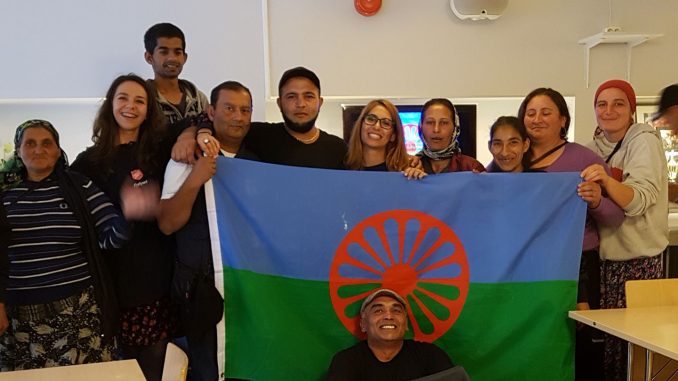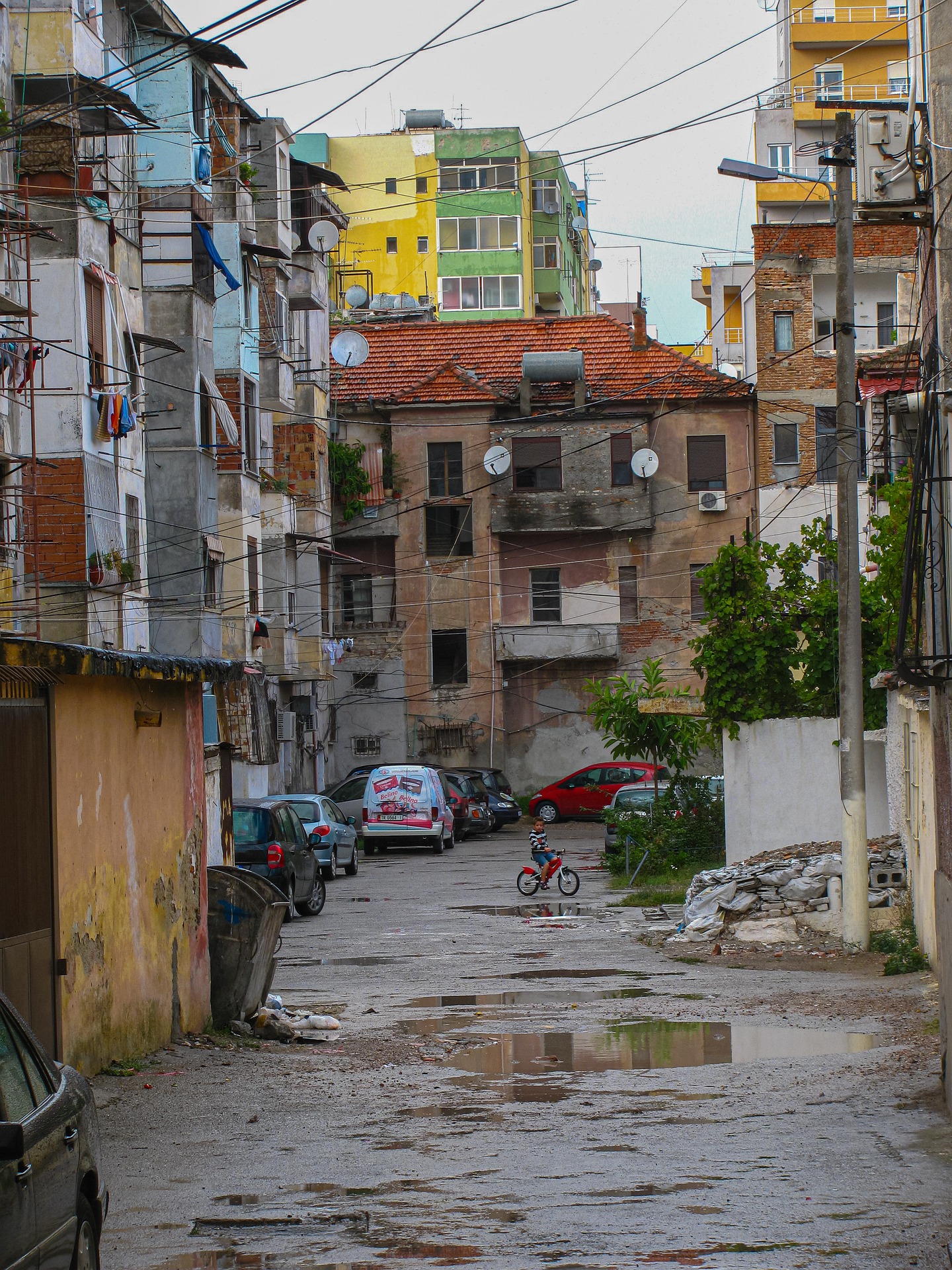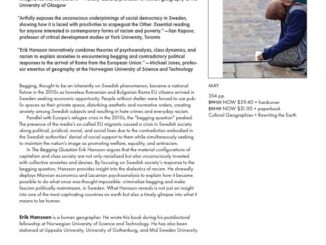
Det här en reportageserie om människor, hemlöshet, utanförskap. Vi har vänt oss till människor och organisationer i Sverige och våra grannländer och kommer berätta om hur man på olika sätt gör skillnad. #UtanBostad
Maria Dumitru is a Roma academic, feminist and human rights advocate from Romania. She holds an MA in Gender Studies from the Central European University, and is currently working for the World Bank in Romania and the Roma feminist theatre Giuvlipen. This article is based on her MA thesis and the research findings are hers alone. Dumitrus thesis is entitled “Multiple Discrimination and Untold Stories of Resistance: a case study of Romanian Roma women conducting informal street work in Oslo”. The research carried out by Dumitru included 10 semi-structured interviews with homeless Romani women in Oslo, as well as several months of participant observation.
This particular article is written in collaboration with Solvor Mjøberg Lauritzen, associate professor in Romani Studies at Södertörn University (Stockholm), and associate professor in Pedagogy at MF Norwegian School of Theology, Religion and Society (Oslo).
Poor men and women leave Romania to seek an income in Western European countries. For some, their best option when staying in Norway is earning an income through carrying out informal street work such as begging, collecting bottles or selling magazines. In Oslo, where the research forming the background for this article was carried out, they are met with extreme prejudice and racism, manifesting itself in discrimination and hate crime. This research sheds light on the female experience of being a homeless migrant and the resistance the women make.
The research draws on an intersectional analysis, meaning that different types of discrimination is considered. Bitu and Vincze (2012) has argued that Romani women represent a pure case of intersectionality. Jovanović, Kóczé, and Balogh (2015) specifies that many are subject to a triple discrimination, based on race, gender, and class. This research brings the experiences and voices of homeless, migrant, Romani women to the fore. It shows that the horrible conditions of living outside, the status of being both homeless, migrant and an informal street worker, exacerbates the discrimination and brings additional issues into their everyday lives. But the research doesn’t stop there: It also brings in a perspective of resistance, describing how the Romani women find strength to go on, build communities of solidarity, and fight for a better future.
Needless to say, due to poverty, lack of resources and exclusion, these women also live in difficult circumstances back home in Romania. For instance, one of the women interviewed had entered into an arranged marriage at the age of 14, another had been living with a man who was an alcoholic and was violent to her. When he left her she was alone with her four children. Back in Romania they live in poverty with poor housing conditions and face discrimination and racism on an everyday basis. They come to Norway in the hope that they will earn enough money to make small changes in their own lives and in the lives of the next generation. But this comes with a price: Life as homeless in Oslo is extremely hard for these women.
“I am scared because I am alone here…”
You might think that because you get used to seeing homeless people, they are also getting used to being homeless. But the women in Oslo draw a completely different picture. They suffer from having to sleep outside. The conditions are rough. They all express that they are afraid. They are afraid of the police, who may wake them up to chase them from where they are sleeping. And they are afraid of ordinary people who harass them:
“It is dangerous to sleep outside (…) To be honest, I don’t know what they wanted from me; they started laughing at me very strangely while speaking Norwegian, and when I ran away, they started to chase me…”.
Because they come with a background of extreme poverty, they already possess a precarious state of health. Sleeping outdoors worsens this, and the Roma women express deep concerns for the consequences homelessness has on their health. Sleeping outside makes them extraordinary tired and depressed.
“I am afraid I will die on the street…”
Elena suffers from asthma and is often afraid she will die on the street. Marioara has gone through five surgeries in the stomach and suffers terribly from the cold, which makes it very hard to work and sleep outside.
“I am also sick…. (crying), you see… I don’t put on weight. I am suffering from many diseases.” (Lina)
Not a single day passes without them experiencing different forms of harassment, including sexual harassment and racism.
“They kick my glass or take my money. They spit when we are on the street”.
“Every day, at my begging spot a man harasses me, I do not understand him, but he is angry at me, he screams at me, and today he hit my cup and the things I had with me” (Veronica)
In the interviews the women explicitly express that they face discrimination because they are “gypsies”, which is obviously used as a racial slur. “Gypsy” is associated with extremely negative stereotypes such as criminality:
“Because I am a Gypsy, and they believe that all Gypsies steal and cheat. But it’s not like that. I am not a criminal. Not all of us are the same” (Lenuta).
“You see me dirty…”
Living on the streets is also an unworthy circumstance due to the impossible for the women to look after their personal hygiene. It is heartbreaking to hear them describe how they are denied to opportunity to go to a toilet or to wash their hands. No one wants to be dirty.
“You see me dirty, but I shower whenever I have the chance. I cry about this thing. For instance, this morning, I spilled a glass of coffee on my blouse, and I had no place to wash my hands or my blouse. Do you understand how difficult it is? (Talking with desperation)… I am not allowed to get to go to a café.”
Needless to say, begging and other informal street work is a last resort. They all say that they want to work. The begging makes them feel ashamed: “I want to work, but who will hire me? I don’t want to beg, but who will feed my children?” (Adina)
It is a disgrace. The quotes only scratch the surface of how horrible it is to live homeless in a foreign country, meeting discrimination and hate every day. And in the midst of this, these women were not passive victims, they were active agents.
“Capacity to endure, suffer and persist”
As the theoretician Saba Mahmood says, agency is not only about progressive change, but it is also “capacity to endure, suffer and persist” (Mahmood, 2001, p. 217). That is especially important in contexts where the room for maneuver is small, where life is not giving many chances.
But their resistance also had a long-term perspective. Although the women didn’t see much potential for improvement in their own lives, they found motivation to go on in the hope that their efforts would improve the lives of their children and grandchildren. As Carmen and Lenuta described:
“I am coming to Oslo to collect bottles and to beg in order to pay my rent, my utilities, electricity, water, and food but also give money to my young grandchildren who are now getting to school. I have big hopes for them” (Carmen)
“I am here for my children, I am living homeless, but home I have to maintain and to support two students. My son will be in the police school, and my daughter is now in high school. I would do anything for them; they are my life. I am begging, I am collecting bottles, I am also cleaning to a lady from time to time, so you see, I do everything that I can” (Lenuta)
In these women’s lives, it is obvious that community building is also a form of resistance and a coping mechanism. They show an impressive ability to remain resilient despite the adversities and discrimination they are facing, and despite the harsh conditions of sleeping outside and carrying out informal street work. They keep their very last drop of energy and strength in building a community where they feel safe and accepted.
Being alone and living in these precarious life conditions pushes the Roma women to stay together, express solidarity with one another and form a community where they will feel comfortable. They care for each other and try to form a community that provides support and help. As a mechanism of resistance, people who once were strangers become family, and they are ready to jump into one another’s defense.
Challenging stereotypes
In the interviews it also became clear that the women were well aware of the antigypsyist prejudice against them. They therefore used the interview as an opportunity to challenge the stereotypes against them.
Adina addressed the antigypsyist tendency to generalize about poor migrants carrying out informal street work. As she put it:
“We are not all the same. Whenever I go to a shop to buy something, people are staring at me as they believe that I will steal something. It is so uncomfortable because I am not a criminal” (Adina)
In 2017, the Norwegian Broadcasting Corporation NRK sent a documentary called “Lykkelandet” [The lucky land]. The “documentary” used a few cases of criminality among Roma migrants in Bergen in Norway as the starting point, and claimed that this was representative for all Roma migrants in Norway. The documentary had a massive impact in Norway: Politicians changed their position on putting a ban on begging, and the migrants carrying out informal street work were attached on the streets. Even years later the documentary is still impacting the lives of Roma beggars. Marioara had heard about the documentary and commented on it:
“I heard about that documentary, it might be true, but I doubt. Look how we live, I have neither palaces nor money, I do not sell drugs and I live on the streets. (…) They [Norwegians] say we are criminals, but that is not true, I am not a criminal, not every Norwegian or Romanian are the same, neither the Roma people” (Marioara)
Lifting these women’s voices to the fore it becomes very clear that they, despite the antigypsyis portrayal of them as a homogenous group, are different individuals with different stories, different experiences, and different opinions. As one of them underlined: “We are all human”
What they have in common is that they due to poverty and exclusion, have found it necessary to leave their homes and their families to earn money in a Western country. In Norway they are met with continuous antigypsyist prejudice, face danger and harsh environments when forced to live and work on the streets, and show their strength in their ability to suffer, endure and persist. In order to find strength, they build communities of trust, and live from the hope that their efforts will contribute to better life chances for their children and grandchildren.
Written by Maria Dumitru and Solvor Mjøberg Lauritzen
References
Bitu, N., & Vincze, E. (2012). Personal Encounters and Parallel Paths toward Romani Feminism. Signs: Journal of Women in Culture and Society, 38(1), 44-46.
Jovanović, J., Kóczé, A., & Balog, L. (2015). Intersections of Gender, Ethnicity, and Class: History and Future of the Romani Women’s Movement. Working paper. Accessed from http://archive.ceu.hu/sites/default/files/publications/fes-cps-working-paper-roma-women-gender-politics-2015.pdf
Mahmood, S. (2001). Feminist Theory, Embodiment, and the Docile Agent: Some Reflections on the Egyptian Islamic Revival. Cultural Anthropology, 16(2), 202.
Att vara en oberoende tidning kostar pengar så vill du hjälpa oss med att betala vårt fika får du gärna swisha en slant till 123 242 83 40 eller bg: 5534-0046
Vill du annonsera eller sponsra, synas eller höras i våra media?
Kontakta oss på redaktionen@dikko.nu
eller ring 0768 44 51 61
IBAN: SE19 9500 0099 6042 1813 4395
BIC: NDEASESS




